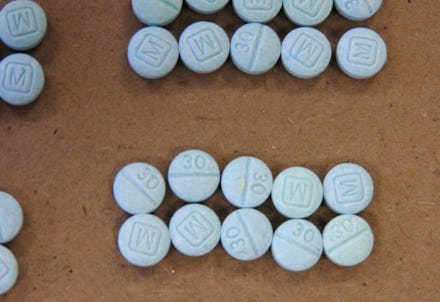7 People in California Die After Taking Counterfeit Prescription Painkillers

Another layer in the national prescription painkiller crisis: Counterfeit opiates appear to be killing people in California. As the Guardian reports, Sacramento, California, has seen at least seven deaths caused by drug overdoses. Officials believe these cases may be related to drug fentanyl, an opioid that works similarly to heroin and oxycodone.
Read more: Law Professor Highlights Big Double Standard in How We Treat Opioid Versus Crack Addiction
Fentanyl may have caused a rash of overdose cases, "I've never seen anything like this," Dr. Olivia Kasirye, county health officer, told the Guardian, saying that a white pill stamped M367, which closely resembles a handful of generic painkillers, appeared to be the culprit. Twenty-eight people in Sacramento, overdosed in a one-week period starting on March 23, the Los Angeles Times reported.
With these pills, people think they're getting Vicodin, Lortab or Norco, but they're really getting pure fentanyl, which is a much stronger opiate — 25 to 50 times the strength of heroin and 50 to 100 times more powerful than morphine, according to the Guardian. Dosage based on a less potent drug could mean an overdose or even death.
"It happens very quickly," Kasirye continued. "People would start feeling dizzy after a few minutes and within 20 minutes were collapsing."
Fentanyl has been spreading from the East Coast across the country, with a more than seven-fold increase in seizures of illegal fentanyl between 2012 and 2014. According to the Times, these knock off painkillers go for around $5 on the street; according to the Guardian, a kilo of fentanyl costs around $3,300 and can be flipped for a profit of over $1 million. The drug itself is thought to be produced primarily in China.
According to the Los Angeles Times, fentanyl can kill even when it's taken in small doses — it's the most potent member of the painkiller family, which is why it's long been given to cancer patients to help ease severe pain. Nausea, dizziness, weakness, headaches and drowsiness are common side effects.
In 2014, 28,000 people died from opioid overdose in the U.S. On Tuesday, President Barack Obama shared his plan to combat prescription painkiller addiction, in addition to the $1.1 billion he pledged to the cause in February. These new initiatives highlight addiction treatment and expansion of mental health services.
Recently, the Food and Drug Administration announced that it would be updating the warning labels on certain prescription opioids to reflect the very real danger they pose to consumers, as addiction and overdose have "reached epidemic levels" in the U.S.
The effort to rein in the overprescription of painkillers, however, may be what's driving people to these counterfeit drugs. Once the addiction has formed, patients whose doctors will no longer prescribe them opioids will often resort to buying the drugs off the black market, the Guardian reported. Which is what makes regulation so hard — and what makes it all too likely that counterfeit fentanyl will continue to sneak into off-brand drugs.
If nothing else, the situation in California should be a signal of just how important it is to make treating addiction a part of the war on prescription drugs. The failure to do so will mean more deaths.